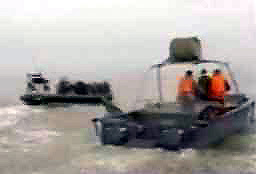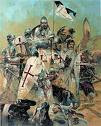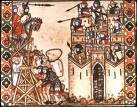 Joe Biden, the Senator from Deleware , appears in an article and on video in the Washington Post claiming that the surge has failed. He analogizes the surge to a water balloon where if you squeeze in one area, you just get a bulge in another. Further, he opines that what the U.S. should do is impose a loose, decentralized government on Iraq so that the parties can have a "time out." I applaud Joe Biden for being one of the few Democrats to address the surge and to propose a plan for Iraq – the fact that his thoughts and proposals are dangerously superficial and sophomoric notwithstanding.
Joe Biden, the Senator from Deleware , appears in an article and on video in the Washington Post claiming that the surge has failed. He analogizes the surge to a water balloon where if you squeeze in one area, you just get a bulge in another. Further, he opines that what the U.S. should do is impose a loose, decentralized government on Iraq so that the parties can have a "time out." I applaud Joe Biden for being one of the few Democrats to address the surge and to propose a plan for Iraq – the fact that his thoughts and proposals are dangerously superficial and sophomoric notwithstanding.
One, Biden’s claim at this point that the surge has failed is pure prevarication. Whether the surge will succeed is an open question. Only about half of the U.S. troops are in place at this point. Where the surge has targeted, there has been a significant decrease in violence. Biden is correct that the epicenters of violence have largely left Baghdad, but that does not mean that Biden's water balloon analogy is a valid criticism of the surge.
The strategy behind the counterinsurgency plan instituted by General Petraeus is incremental. It hinges on minimizing violence and giving all elements of civil society a chance to take root until, block by block, the populace buys into fully supporting the government. When that happens, the insurgents cannot again take root. Such strategy in fact assume that singular acts of violence can and will flare up, as Biden notes happened in Tal Afar. But to claim that such a singlular act of violence shows that the surge has failed totally misapprehends the strategy of the surge.
The current surge of 21,500 troops in Baghdad is a textbook example of [counterinsurgency] . . . lessons in action. First, as in the northern city of Mosul in 2003-04, where he used a similar grid system, Gen. Petraeus aims to turn things around in the single most vital "pink" zone--namely, Baghdad and its environs, within whose 50-mile radius 80% of the violence in Iraq takes place. Critics have already charged that our recent successes in suppressing the militias in this area signify only a temporary respite. But Gen. Petraeus, . . . understands that in counterinsurgency warfare, temporary respites are all there is. The goal is to make those respites last longer and longer, until eventually they become permanent. As he has said, "The idea is to end each day with fewer enemies than when it started." Anything more ambitious leads to overreaching, disenchantment, and ultimately failure.
The Baghdad surge also illustrates the second of Galula's lessons. "Increasing the number of stakeholders is crucial to success," writes Gen. Petraeus, . . . In the northern district of Kabylia, for example, Gen. Petraeus had his men operating schools for 1,400 children, including girls, offering free medical support, and helping with building projects and road construction. One of his proudest accomplishments was the help given by troops of the 101st Airborne in rebuilding and opening Mosul University.
Gen. Petraeus's field manual states: "Some of the best weapons do not shoot." They come instead in the form of meetings held with local leaders, wells drilled, streets repaired, soccer leagues organized. In the current surge, one of his stated goals is to get American soldiers out of Baghdad's Green Zone to meet, eat with and even live with Iraqi families. Such "cultural awareness," to quote Gen. Petraeus again, "is a force multiplier." Political victories won street by street and neighborhood by neighborhood do not so much destroy the insurgency--it cannot be destroyed in any traditional sense--as replace it, forcing the bond between insurgent and citizen to give way to a new bond between citizen and government.
Finally, . . . Gen. Petraeus's men in northern Iraq trained more than 20,000 Iraqi police who even now continue to patrol the border between Iraq and Turkey. It was, in fact, Gen. Petraeus's success in organizing and staffing a reliable Iraqi security force that convinced his superiors to put him in charge of training the new Iraqi army and to make him commander of American ground forces this year. Now his experience is being put to the test on a broader scale as we attempt, in his words, to "build institutions, not just units"--a process as vital to American success in Iraq as it was to French success in Algeria 50 years ago.
Will [the surge] . . . work? That is not the crucial question. It has been done before, and it can be done again; at least, it can be done on the ground. The crucial question is whether the political will exists to see it through to the end.
The above comes from an excellent article about modern counterinsurgency theory and its roots in the French experience in Algeria. You can read the article
here.
Biden next asks, “assuming the surge works, then what, we stay there forever?” That;s pretty nonsensical, actually. Again, I refer to the explanation of counterinsurgency theory linked above. If the surge works, it means that Shia and Sunni in Baghdad are now supporting the central government and the government will be able to function in those areas. Further, it means that the local forces are providing the vast bulk of security. Insurgents or militants may be able to strike in those areas on occasion, but they will not be able to take root. Clearly, in such an instance, a much smaller force of U.S. soldiers, if any, will be required to remain in Iraq.
Biden’s claim that a Shia (he says Sunni, he means Shia) dominated government will never share power ignores some critical political developments going on in the country at the moment. The Shia hardly form a single electoral block. See
here and
here. Some, like Sadr, have clearly come under the influence of Khomeinist Iran. As shown in the above links, a significant number within the Shia bloc are secular and virulently opposed to Iranian influence. Moreover, there have been clear movements by Shias to reach across to Sunnis and Kurds to form a governing alliance in light of Sadr's close ties with Iran, the acts of his militia in spreading chaos, and Sadr's threats to withdraw his support from the Maliki government. For
example:
The Iraqi daily "Al-Azzam" reported on December 12 that the main Shi'ite party in Iraq, the Supreme Council for the Islamic Revolution in Iraq (SCIRI), has been in discussions with the Kurdish Alliance and the Sunni-led Iraqi Islamic Party to form a new political coalition. The aim would be to exclude al-Sadr's bloc, whose support the current government relies on to survive. Although politicians involved in the preliminary discussions denied that they were seeking to sideline al-Sadr's bloc, comments by Deputy Prime Minister Barham Salih of the Kurdish Alliance on December 12 clearly suggest that the main cause of the current political crisis are militant politicians like al-Sadr.
"We call for resolving the militia issue, which is certainly the key to defusing the crisis." "A number of key political parties, across the sectarian-ethnic divide, recognize the gravity of the situation and have become increasingly aware that their fate, and that of the country, cannot be held hostage by the whims of the extreme fringe within their communities,"
Part of the problem has been that the Sunnis largely refused to take part in the political process at its inception. Whatever may have been true before, it is true
no longer:
There is a real and growing ground swell of Sunni tribal opposition to the Al Qaeda-in-Iraq terror formations. (90% Iraqi.) This counter-Al Qaeda movement in Anbar Province was fostered by brilliant US Marine leadership. There is now unmistakable evidence that the western Sunni tribes are increasingly convinced that they blundered badly by sitting out the political process. They are also keenly aware of the fragility of the continued US military presence that stands between them and a vengeful and overwhelming Shia-Kurdish majority class--- which was brutally treated by Saddam and his cruel regime. There is now active combat between Sunni tribal leadership and AQI terrorists. Of even greater importance, the Sunni tribes are now supplying their young men as drafts for the Iraqi Police. (IP). AQI is responding with customary and sickening violence. Police are beheaded in groups; families of IP officers are murdered (or in one case a 12 year old boy was run over multiple times by a truck in front of his family)—all designed to intimidate the tribes. It is not working. The Takfiri AQI extremism of: no music, no photos, no videos, no cutting of beards, etc does not sit well with the moderate form of Islam practiced among the western tribes. This is a crucial struggle and it is going our way—for now.
As to welcoming Sunnis into the government, probably the most critical hurdle is the de-Baathification process. And in fact, PM Maliki met with Sunni leaders during a recent trip to Anbar province to discuss this. The end result was introduction of formal legislation to
end the de-Baathification process. The New York Times reported that this process was brought to a halt a few days later when Grand Ayatollah Sistani
refused to endorse the legislation. What did not appear in the New York Times was Grand Ayatollah Sistani’s statement issued shortly thereafter that the report of him refusing to endorse the de-Baathification legislation
was false. Thus, the critically important issue of ending the de-Baathification and bringing Sunnis back into all phases of the government structure is continuing apace.
Likewise in importance to bringing the Sunnis peacefully into the government is a responsible plan for sharing oil revenues among the provinces. And though Joe Biden ignores this, a
hydrocarbon law to allow for the use and sharing of oil revenues, has also been formally introduced and is also continuing apace.
Next as proof that the surge is not working, Biden cites the Mahdi Army and Sadr’s recent call for renewed violence by the Iraqi police and military against the U.S. So far, Sadr's call has not been answered. Indeed, Biden does not address exactly what power Sadr now has. Sadr himself is in hiding in Iran. His recent call for a massive demonstration on April 9 – at which his followers estimated the expected turn out to be close to 1,000,000 people - can only be described as an
abject failure. The turn out was in fact less then 10,000. How much support Sadr actually has now is very much in question, as is any control he has over the Mahdi Army. A few thousand of the militia have broken off and are now directly
funded and trained by Iran. A significant portion of the remainder is apparently seeking
raproachment with the Maliki government. The much vaunted Mahdi Army seems to have come apart at the seams, and it appears that Sadr's once massive political base is following suit.
Biden cites the recent
violence in Tal Afar, a mixed town of Sunnis and Shias near the Turkish border. It has been very peaceful for the past years, and indeed was singled out by President Bush as a model for precisely that reason. A few weeks ago, a Sunni insurgent entered Tal Afar in a truck loaded with flour that he said was being distributed by the government free of charge. When the local women and children gathered round, the insurgent detonated explosives hidden under the flour, killing 80 people and wounding 185. Local Shias and police went on a rampage, executing about 7o of the local Sunnis before Iraqi police stepped in to restore order and, in fact, arrested the 18 local Iraqi policman who committed the reprisal executions. That arrest is of critical importance. If the Sunni see the government handling this situation appropriately and see justice served, it will be another big piece in establishing the government as a viable representative of all elements of Iraqi society. Moreover, this was a single act of violence. Tal Afar is not today out of control. As noted above in the strategy of counterinsurgency, it is unrealistic to expect all violence to be immediately quelled. What occurred in Tal Afar was a tragedy, but it does not indicate a failure of the surge, nor does it provide support for Biden’s water balloon theory.
Lastly, Biden’s plan to segregate the government into a loose confederation is sophomoric and superficial. Imposing a loose confederation will do nothing to stem the violence. It will not provide for a "time out." As to the local Sunni insurgents, they are not fighting just so they can have a Sunni only government in Anbar province. To the contrary, they are fighting to
reassert Sunni ascendancy over the entirety of Iraq.
The motives of these groups include a desire to: 1)resist occupation; 2) subvert or overthrow the new Iraqi government; and/or 3) establish an Islamic state or caliphate in Iraq. More fundamentally, the insurgency is about power: who had it, who has it now, and who will have it in the future. Indeed, major elements of the Sunni Arab insurgency seek to regain power—as individuals, as members of the former regime, or as a community.
And it is the same for al Qaeda in Iraq, the group that has proved so deadly. There is a reason Al Qaeda in Iraq is so named and not called Al Qaeda in Anbar. As al Qaeda’s second in command, Ayman al
Zawahiri wrote in a letter captured in 2005 by U.S. forces in Iraq:
The letter states that al Qaeda leadership has have developed a detailed plan to create an Islamic state centered on Iraq, which would include neighboring countries.
In light of these goals, Biden’s plan to somehow end the violence by imposing a decentralized government with Sunni’s in control only over Anbar and with a piece of the oil revenues seems nonsensical. Moreover, it completely ignores another critical fact. It is only through a reasonably strong central government with Kurd and Sunni involvement that the Khomeinist influence of Iran’s theocracy will be minimized in Iraq. Neither Kurd nor Sunni have any love for their neighbor. But in a decentralized government, the Khomeinist theocracy will have an
opportunity to significantly influence if not dominate politics of the Shia government in the south. It is the worst of all possible outcomes for the United States.
It must be emphasized that Joe Biden, less then two years ago, was pushing very hard for the Bush administration to incerease the troops in Iraq specifically to win the
counterinsurgency battle.
Sen. Joseph Biden Jr., appearing on ABC's "Good Morning America," disputed Bush's notion that sufficient troops are in place.
"I'm going to send him the phone numbers of the very generals and flag officers that I met on Memorial Day when I was in Iraq," the Delaware Democrat said. "There's not enough force on the ground now to mount a real counterinsurgency."
Biden argued, "The course that we are on now is not a course of success. He (Bush) has to get more folks involved. He has to stand up that army more quickly."
Yet today, Senator Biden is declaring a viable counterinsurgency plan dead on arrival, and is voting for a date certain to withdraw from Iraq - something he
saw as dangerouly ridiculous previously:
"A deadline for pulling out … will only encourage our enemies to wait us out" … it would be "a Lebanon in 1985. And God knows where it goes from there."
I am not sure if Senator Biden has, as have most of his other Democratic colleagues, cynically adopted the far left meme of MoveOn.org for the purposes of partisan political gain, or whether he is simply as dangerously superficial in his analysis as indicated above. It is clearly one of the two.
Read More...
Summary only...
 Taqiyya means: "Concealing or disguising one's beliefs, convictions, ideas, feelings, opinions, and/or strategies at a time of eminent danger, whether now or later in time, to save oneself from physical and/or mental injury." It is also used as a disinformation tactic to confuse or bamboozle kafirs or non-believers.
Taqiyya means: "Concealing or disguising one's beliefs, convictions, ideas, feelings, opinions, and/or strategies at a time of eminent danger, whether now or later in time, to save oneself from physical and/or mental injury." It is also used as a disinformation tactic to confuse or bamboozle kafirs or non-believers.
















